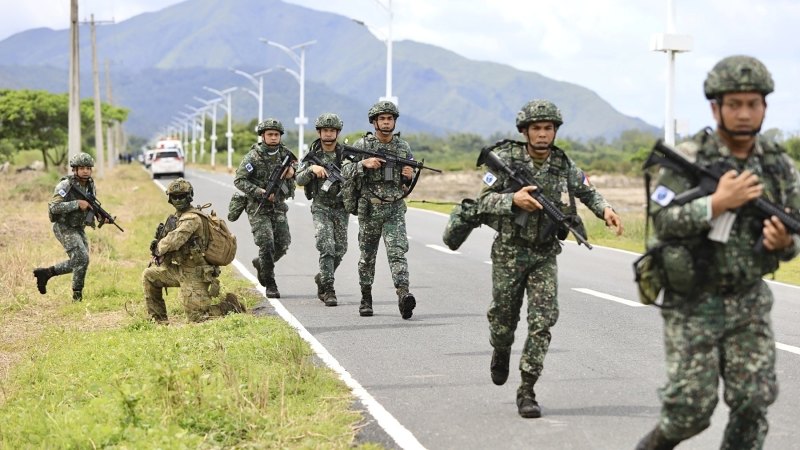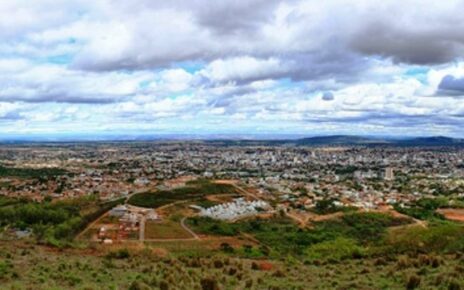Save articles for later
Add articles to your saved list and come back to them any time.
Manila: Australian and Filipino forces, backed by US Marines, practised retaking an island seized by hostile forces in a large military drill on the north-western Philippine coast facing the disputed South China Sea.
The drills included mock beach landings, amphibious assaults and helicopter drops of personnel at a naval base in San Antonio, in Zambales province, and involved 1200 Australians, 560 Filipinos and 120 US Marines.
Australian and Filipino Forces participate in a large-scale combined amphibious assault exercise at a naval base in San Antonio, Zambales, Philippines, on Friday.Credit: DND Defence/AFP via AP
They followed exercises on Monday when the three countries’ forces conducted air assault manoeuvres in Rizal town in western Palawan province, which also faces the disputed waters.
The countries are among the most vocal critics of China’s increasingly aggressive and confrontational actions in the disputed waters, but the Philippine military said Beijing was not the envisioned target of the combat drills, the largest so far between Australia and the Philippines.
“It’s an important aspect of how we prepare for any eventuality and considering that there have been so many events that attest to the volatility of the region,” President Ferdinand Marcos jnr said after watching the Friday drills with and Philippine Defence Secretary Gilbert Teodoro jnr and visiting Australian Defence Minister Richard Marles.
Australian Defence Minister Richard Marles, centre, with Philippine National Defence Secretary Gilberto Teodoro jnr, centre left, Australian ambassador to the Philippines Hae Kyong Yu, centre right, and Australian and Filipino forces before the drills.Credit: DND/AFP/AP
Marles said in a separate news conference with his Philippine counterpart that the drills were aimed at promoting the rule of law and peace in the region.
“The message that we want to convey to the region and to the world from an exercise of this kind is that we are two countries committed to the global rules-based order,” Marles said. “We are committed to an idea of a world in which disputes are determined by reference to international law.”
“Peace is maintained through the protection of the global rules-based order and its functionality around the world and, in truth, around the world today, we see it under pressure,” Marles said.
Marles and Teodoro said in a joint statement that they would pursue plans for joint patrols in the South China Sea, which the Australian defence chief said may be launched soon.
A US Marines MV-22B Osprey lands as part of large-scale exercises by Australia, Filipino and American troops int he South China Sea.Credit: DND/AFP via AP
They reaffirmed support for a 2016 ruling by an arbitration tribunal in The Hague under the UN Convention on the Law of the Sea that largely invalidated China’s claim to virtually the entire South China Sea and upheld the Philippines’ control over resources in a 200-nautical mile exclusive economic zone.
China refused to participate in the arbitration and continues to defy the ruling.
In the latest flare-ups in the disputes, a Chinese coast guard ship used a water cannon on August 5 to try to block a Philippine supply run at Second Thomas Shoal, where Filipino troops are stationed.
Watching out for trouble in the South China Sea: Australian Defence Minister Richard Marles, left, and Philippine President Ferdinand Marcos jnr, centre, watch the combined amphibious assault exercise on Friday.Credit: PCO/AFP via AP
Australia and the US expressed support to the Philippines and raised strong concerns over the Chinese coast guard ships’ actions. Washington renewed a warning that it is obligated to defend the Philippines, its oldest treaty ally in Asia, if Filipino forces, ships and aircraft come under attack, including in the South China Sea.
Two Philippine supply boats managed to pass the Chinese blockade on Tuesday in a tense confrontation witnessed by journalists.
China has warned the US not to meddle in what it says is a purely Asian dispute. Washington has said it will continue patrolling the disputed waters to promote freedom of navigation and overflight.
Aside from China and the Philippines, Vietnam, Malaysia, Brunei and Taiwan have overlapping territorial claims in the waterway, a potential Asian flashpoint which has also become a delicate front in the U.S.-China rivalry.
AP
Most Viewed in World
From our partners
Source: Read Full Article






